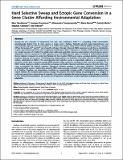Por favor, use este identificador para citar o enlazar a este item:
http://hdl.handle.net/10261/82554COMPARTIR / EXPORTAR:
 SHARE SHARE
 CORE
BASE CORE
BASE
|
|
| Visualizar otros formatos: MARC | Dublin Core | RDF | ORE | MODS | METS | DIDL | DATACITE | |

| Título: | Hard selective sweep and ectopic gene conversion in a gene cluster affording environmental adaptation |
Autor: | Hanikenne, Marc; Kroymann, Juergen; Trampczynska, Aleksandra; Bernal Ibáñez, María CSIC ORCID; Motte, Patrick; Clemens, Stephan; Krämer, Ute | Fecha de publicación: | 22-ago-2013 | Editor: | Public Library of Science | Citación: | Hanikenne M, Kroymann J, Trampczynska A, Bernal M, Motte P, Clemens S, Krämer U. Hard selective sweep and ectopic gene conversion in a gene cluster affording environmental adaptation. Plos Genetics 9 (8): e1003707 (2013) | Resumen: | Among the rare colonizers of heavy-metal rich toxic soils, Arabidopsis halleri is a compelling model extremophile, physiologically distinct from its sister species A. lyrata, and A. thaliana. Naturally selected metal hypertolerance and extraordinarily high leaf metal accumulation in A. halleri both require Heavy Metal ATPase4 (HMA4) encoding a PIB-type ATPase that pumps Zn2+ and Cd2+ out of specific cell types. Strongly enhanced HMA4 expression results from a combination of gene copy number expansion and cis-regulatory modifications, when compared to A. thaliana. These findings were based on a single accession of A. halleri. Few studies have addressed nucleotide sequence polymorphism at loci known to govern adaptations. We thus sequenced 13 DNA segments across the HMA4 genomic region of multiple A. halleri individuals from diverse habitats. Compared to control loci flanking the three tandem HMA4 gene copies, a gradual depletion of nucleotide sequence diversity and an excess of low-frequency polymorphisms are hallmarks of positive selection in HMA4 promoter regions, culminating at HMA4-3. The accompanying hard selective sweep is segmentally eclipsed as a consequence of recurrent ectopic gene conversion among HMA4 protein-coding sequences, resulting in their concerted evolution. Thus, HMA4 coding sequences exhibit a network-like genealogy and locally enhanced nucleotide sequence diversity within each copy, accompanied by lowered sequence divergence between paralogs in any given individual. Quantitative PCR corroborated that, across A. halleri, three genomic HMA4 copies generate overall 20- to 130-fold higher transcript levels than in A. thaliana. Together, our observations constitute an unexpectedly complex profile of polymorphism resulting from natural selection for increased gene product dosage. We propose that these findings are paradigmatic of a category of multi-copy genes from a broad range of organisms. Our results emphasize that enhanced gene product dosage, in addition to neo- and sub-functionalization, can account for the genomic maintenance of gene duplicates underlying environmental adaptation. © 2013 Hanikenne et al. | Descripción: | 13 Págs., 7 Figs., 6 Tabls. 9 Pag., 8 Fig. This is an open-access article distributed under the terms of the Creative Commons Attribution License, which permits unrestricted use, distribution, and reproduction in any medium, provided the original author and source are credited. | Versión del editor: | http://dx.doi.org/10.1371/journal.pgen.1003707 | URI: | http://hdl.handle.net/10261/82554 | DOI: | 10.1371/journal.pgen.1003707 | ISSN: | 1553-7390 | E-ISSN: | 1553-7404 |
| Aparece en las colecciones: | (EEAD) Artículos |
Ficheros en este ítem:
| Fichero | Descripción | Tamaño | Formato | |
|---|---|---|---|---|
| BernalM_ PloSGenet_9_8_e1003707.pdf | 777,85 kB | Adobe PDF |  Visualizar/Abrir |
CORE Recommender
PubMed Central
Citations
33
checked on 22-abr-2024
SCOPUSTM
Citations
65
checked on 20-abr-2024
WEB OF SCIENCETM
Citations
63
checked on 21-feb-2024
Page view(s)
576
checked on 23-abr-2024
Download(s)
398
checked on 23-abr-2024
Google ScholarTM
Check
Altmetric
Altmetric
Artículos relacionados:
NOTA: Los ítems de Digital.CSIC están protegidos por copyright, con todos los derechos reservados, a menos que se indique lo contrario.
